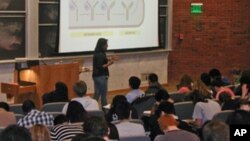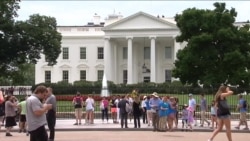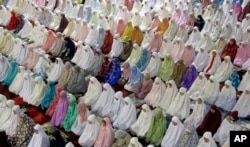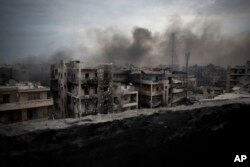It seems simple enough: Find out what young Americans know about the world and their place in it.
So, earlier this year, the Council on Foreign Relations and National Geographic commissioned a survey "to gauge what young people educated in American colleges and universities know about geography, the environment, demographics, U.S. foreign policy, recent international events and economics."
Well, evidently, it wasn't that simple, because most of the students who took the survey failed miserably.
General knowledge?
The survey was given to more than 1,000 young people between the ages of 18 and 26 who had attended a college or university. It asked a broad series of questions on issues that the surveyors believe should be general knowledge for all U.S. college students.
And putting aside who's to blame, the students didn't know most of the answers.
Quoting from the foreword of the study, "Only 28 percent of respondents knew that the United States is bound by treaty to protect Japan if it is attacked. Meanwhile, only 30 percent knew that the constitutional authority to declare war rests in the legislative branch of the U.S. government."
And only 29 percent were able to pinpoint Indonesia as being a Muslim-majority country when offered the choice alongside South Africa, Armenia and India.
Downside of internet
Part of the problem, according to the surveyors, is that it's becoming harder to get good, solid, authoritative information about what is going on in the world, thanks to the internet.
"People don't know what to believe anymore, so right now, when you go online, you never have to encounter anything that is different from your worldview because it is coming into your news feed," said Susan Goldberg of the National Geographic Society. "You're not going through a newspaper, going through looking at headlines, saying, ‘Isn't that interesting? I don't agree with that.’ "
Another problem, according to Richard Haass of the Council on Foreign Relations, is that this kind of material isn't being pushed on students in the classroom. "The problem is schools do not require that students take these courses in order to graduate," he said. "There is a fundamental difference between offering a course and requiring it."
If such information isn’t required in the curriculum, the surveyor says, the country will end up with more leaders like Libertarian Party presidential candidate Gary Johnson, who had no idea where, or even what, the city of Aleppo, Syria, was when asked about it during an interview.
"We as a society need to challenge a candidate who doesn't know what Aleppo is," Haass said, "or who does not know basic issues, whether it is about immigration or trade or American obligations around the world."
The upside
It's not all bad news.
The students surveyed had an improving grasp of geography and some of the most important issues facing the planet, such as global warming and renewable energy. And they acknowledged the importance of the material they were being asked about, even though they didn't know much about it.
To Haass, that suggests the solution is finding ways to get them good information, both in school and online. To help, the Council on Foreign Relations is creating a new initiative called CFR Campus, designed "to build the essential knowledge, skills and perspective that form the backbone of global literacy."
The National Geographic Society has long pushed international literacy with its annual Geography Bee and funding for exploration.
But for Haass, it's about the U.S. being able to continue what he says is the proactive leadership role the nation plays around the world.
"There's no alternative to a successful, orderly world where the United States plays a large role," he said. "But then we have to have the young men and women prepared to play those significant roles, and this study suggests that we are not producing them in significant numbers or proportions to fill those needs."








